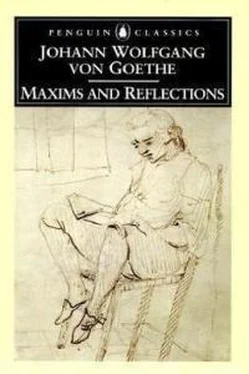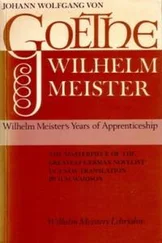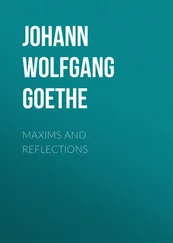281
It is not easy to be in any great assembly without thinking that the chance which brings so many people together will also make us meet our friends.
282
A man may live never so retired a life but he becomes a debtor or a creditor before he is aware of it.
283
If anyone meets us who owes us a debt of gratitude, it immediately crosses our mind. How often can we meet some one to whom we owe gratitude, without thinking of it!
284
To communicate oneself is Nature; to receive a communication as it is given is Culture.
285
No one would speak much in society if he were aware how often we misunderstand others.
286
It is only because we have not understood a thing that we cannot repeat it without alteration.
287
To make a long speech in the presence of others without flattering your audience, is to rouse dislike.
288
Every word that we utter rouses its contrary.
289
Contradiction and flattery make, both of them, bad conversation.
290
The pleasantest society is that in which there exists a genial deference amongst the members one towards another.
291
By nothing do men show their character more than by the things they laugh at.
292
The ridiculous springs from a moral contrast innocently presented to the senses.
293
The sensual man often laughs when there is nothing to laugh at. Whatever it is that moves him, he shows that he is pleased with himself.
294
An intelligent man finds almost everything ridiculous, a wise man hardly anything.
295
A man well on in years was reproved for still troubling himself about young women. 'It is the only means,' he replied, 'of regaining one's youth; and that is something every one wishes to do.'
296
A man does not mind being blamed for his faults, and being punished for them, and he patiently suffers much for the sake of them; but he becomes impatient if he is required to give them up.
297
Certain faults are necessary to the individual if he is to exist. We should not like old friends to give up certain peculiarities.
298
It is said of a man that he will soon die, when he acts in any way unlike himself.
299
What kind of faults in ourselves should we retain, nay, even cultivate? Those which rather flatter other people than offend them.
300
The passions are good or bad qualities, only intensified.
301
Our passions are, in truth, like the phoenix. When the old one burns away, the new one rises out of its ashes at once.
302
Great passions are hopeless diseases. That which could cure them is the first thing to make them really dangerous.
303
Passion is enhanced and tempered by avowal. In nothing, perhaps, is the middle course more desirable than in confidence and reticence towards those we love.
304
To sit in judgment on the departed is never likely to be equitable. We all suffer from life; who except God can call us to account? Let not their faults and sufferings, but what they have accomplished and done, occupy the survivors.
305
It is failings that show human nature, and merits that distinguish the individual; faults and misfortunes we all have in common; virtues belong to each one separately.
306
The secret places in the way of life may not and cannot be revealed: there are rocks of offence on which every traveller must stumble. But the poet points to where they are.
307
It would not be worth while to see seventy years if all the wisdom of this world were foolishness with God.
308
The true is Godlike: we do not see it itself; we must guess at it through its manifestations.
309
The real scholar learns how to evolve the unknown from the known, and draws near the master.
310
In the smithy the iron is softened by blowing up the fire, and taking the dross from the bar. As soon as it is purified, it is beaten and pressed, and becomes firm again by the addition of fresh water. The same thing happens to a man at the hands of his teacher.
311
What belongs to a man, he cannot get rid of, even though he throws it away.
312
Of true religions there are only two: one of them recognises and worships the Holy that without form or shape dwells in and around us; and the other recognises and worships it in its fairest form. Everything that lies between these two is idolatry.
313
It is undeniable that in the Reformation the human mind tried to free itself; and the renaissance of Greek and Roman antiquity brought about the wish and longing for a freer, more seemly, and elegant life. The movement was favoured in no small degree by the fact that men's hearts aimed at returning to a certain simple state of nature, while the imagination sought to concentrate itself.
314
The Saints were all at once driven from heaven; and senses, thought, and heart were turned from a divine mother with a tender child, to the grown man doing good and suffering evil, who was later transfigured into a being half–divine in its nature, and then recognised and honoured as God himself. He stood against a background where the Creator had opened out the universe; a spiritual influence went out from him; his sufferings were adopted as an example, and his transfiguration was the pledge of everlastingness.
315
As a coal is revived by incense, so prayer revives the hopes of the heart.
316
From a strict point of view we must have a reformation of ourselves every day, and protest against others, even though it be in no religious sense.
317
It should be our earnest endeavour to use words coinciding as closely as possible with what we feel, see, think, experience, imagine, and reason. It is an endeavour which we cannot evade, and which is daily to be renewed.
Let every man examine himself, and he will find this a much harder task than he might suppose; for, unhappily, a man usually takes words as mere make–shifts; his knowledge and his thought are in most cases better than his method of expression.
False, irrelevant, and futile ideas may arise in ourselves and others, or find their way into us from without. Let us persist in the effort to remove them as far as we can, by plain and honest purpose.
318
As we grow older, the ordeals grow greater.
319
Where I cannot be moral, my power is gone.
320
A man is not deceived by others, he deceives himself.
321
Laws are all made by old people and by men. Youths and women want the exceptions, old people the rules.
322
It is not the intelligent man who rules, but intelligence; not the wise man, but wisdom.
323
To praise a man is to put oneself on his level.
324
It is not enough to know, we must also apply; it is not enough to will, we must also do.
325
Chinese, Indian, and Egyptian antiquities are never more than curiosities; it is well to make acquaintance with them; but in point of moral and æsthetic culture they can help us little.
326
The German runs no greater danger than to advance with and by the example of his neighbours. There is perhaps no nation that is fitter for the process of self–development; so that it has proved of the greatest advantage to Germany to have obtained the notice of the world so late.
327
Even men of insight do not see that they try to explain things which lie at the foundation of our experience, and in which we must simply acquiesce.
Yet still the attempt may have its advantage, as otherwise we should break off our researches too soon.
328
From this time forward, if a man does not apply himself to some art or handiwork, he will be in a bad way. In the rapid changes of the world, knowledge is no longer a furtherance; by the time a man has taken note of everything, he has lost himself.
Читать дальше








![Иоганн Гёте - Итальянское путешествие [litres]](/books/398657/iogann-gete-italyanskoe-puteshestvie-litres-thumb.webp)



